




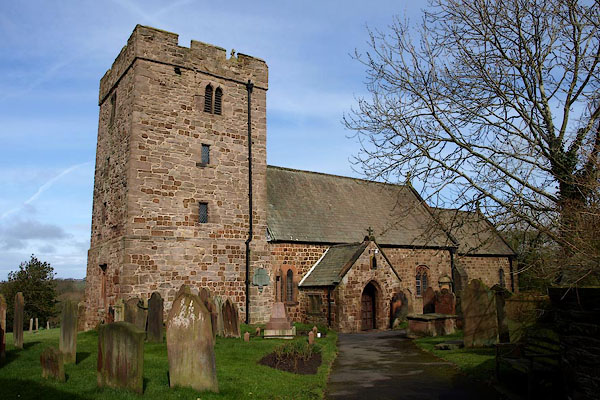
BOU22.jpg (taken 14.3.2008)
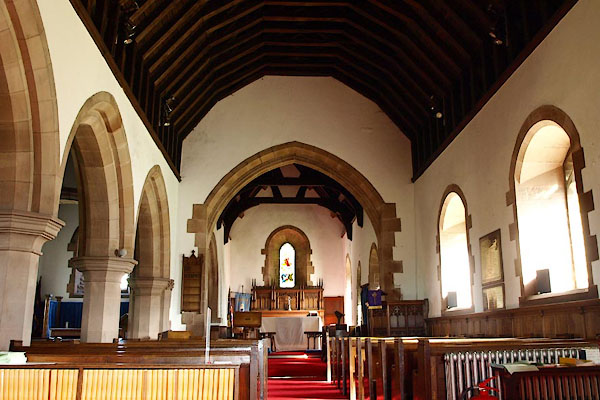
BQH77.jpg (taken 27.3.2009)
"Church (Vicarage) / Grave Yard / Cross"
item:- inscription; stained glass
 goto source
goto sourceGentleman's Magazine 1751 p.254
"... ..."
"To GEORGE SMITH, Esq;"
"SIR,"
"HAving been long absent on a journey, it was not in my power, till now, to give you my sentiments on the inscription you are pleased to propose in a late Magazine."
"I lay it down as a rule, that there is no stroke in these short abbreviated inscriptions, which is not of significance, consequently we must in the first place resolve the ligatures; which being done, I take the letters to be,"
 click to enlarge
click to enlargeG751E01.jpg
"There is an appearance of the Saxon character, particularly in the [G], but as it is well known that letters of that form were in use in the north as late as 1361, (See Mr Drake's Eboracum p.497.) this will be no objection to my referring the inscription to the second century, as you will see I shall do in the sequel; and much less, since you may observe a strong inclination to the more modern form in the [reverse D] and [G] the third and fifth letters."
"'Tis uncertain whether I shall give you that satisfaction you seem to expect from me, in the interpretation I am now going to offer of this imperfect legend; but 'tis much at your service, such as it is, with an entire submission to your better judgment, and the voice of the learned."
"The glazing and painting of windows in our churches being formerly a work attended with great costs and charges, nothing was more common than for benefactions to the fabric of churches and chapels to run in that course. I could multiply examples of this sort, but shall content myself with two authorities, one relating to the south, and the other to the north part of the kingdom. See Somner's Antiq. of Canterb. appendix p.69. Drake's Eboracum p.339, 340, 529. Wherefore observing this epigraph to be in a church window, I conceive the 4 first letters to be the last syllable of the Latin word fenestras, and the inscription to be imperfect at the beginning. If this be so, and the inscription be in the church, and not in the chancel, (which in my opinion would vary the case extremely) I explain it thus;"
"Has fenestras T RAS Galfridus G V D N L reparavit Anno Domini MCL°"
"In English, Geofry Goding repair'd these windows in the year 1150."
"Two or three particulars in this interpretation you will expect I should account for, which I thus briefly attempt."
"GVD"
Paul Gemsege is Samuel Pegge 1704-96.
 goto source
goto sourceGentleman's Magazine 1751 p.255 "GVDNL. 'Tis an usual practice in inscriptions to drop the vowel that should precede a mute; see Sir Andrew Fountaine's Tables of the Anglo-Saxon Coins, and Dr Hick's Thesaurus, Eadmund xvii. 25. AEthelstan ii. AEthelred ii. 3. Eadward iii. 21. inc or ing is a vulgar termination in our English names; see the same author Cnut ix. Aethelred viii. and you have an authority for the C being unfinish'd in one transverse stroke at top, Eadmund xviii. insomuch that this is no other than the common name of Goding, or Gooding, so frequent in the north."
"R. There is a dot or point between the legs of this letter, that seems to denote the abbreviation."
"A. The stroke at the head of this letter shews the abbreviation plainly."
"[triangle]. This is a very arbitrary mark; how it should stand for M, I cannot imagine, and yet it can be nothing else in this case."
"[square]. This form of an O you will find in Sir Andrew Fountaine's alphabet, and others of a sharp lozenge figure both in him and Bouterovius. It is plac'd in your type at the top of the L very apositely, to express the last letter of the word quinquagesimo, which in a numeral would stand in that manner, thus L°.Yours, &c. PAUL GEMSEGE."
"June 8, 1751."
 goto source
goto sourceGentleman's Magazine 1751 p.112 "..."
"An INSCRIPTION in Deerham Church window, near Workington in Cumberland, Communicated by the Vicar to G. S. Esq; who desires Mr GEMSEGE, from his great Knowledge in the Lapidary Stile, or any Gentleman of that Taste, to give the Publick their Opinion about it."
 click to enlarge
click to enlargeG751E01.jpg
"..."
item:- stained glass
 goto source
goto sourcePage 185:- "..."
"The church of Dereham was given by Alice de Romely, widow, to Giseburn abbey. In one of the windows is an inscription, communicated by Mr. G. Smith to the Gentleman's Magazine, XXI. 112, where it was explained by Mr. Pegge, 255, to mean Has fenestras Galfridus Gudng reparavit Anno Domini MCL."
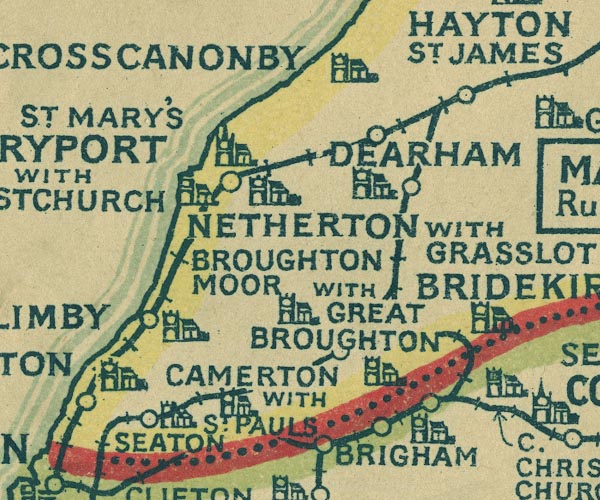
NUR1NY03.jpg
"DEARHAM"
item:- JandMN : 27
Image © see bottom of page
 stained glass
stained glassplacename:- Church of St Mungo
courtesy of English Heritage
"CHURCH OF ST MUNGO / / CHURCH STREET / DEARHAM / ALLERDALE / CUMBRIA / I / 72229 / NY0724736396"
courtesy of English Heritage
"Parish Church. Late C12 with C13 additions and north aisle 1882 by C.J. Ferguson. Mixed St Bees and red hammer-dressed sandstone. Graduated greenslate roof with coped gables and cross finials. Square west 3-storey tower may have been fortified; 3-bay nave with 6-bay aisle and south porch; 2-bay chancel. Tower has 2-light west window and 2-light bell openings, but all other windows are small. Nave has C19 2-light south windows. Porch has pointed arch under trefoil niche; south door is C12 with carved capitals and round-moulded arch. Various medieval grave slab fragments built into east wall of porch. Aisle has 2- and 3-light C19 windows. Chancel has priest's doorway and 2 original south windows; small original east window. Interior of tower base is tunnel-vaulted with segmental arch opening into nave. 4-bay aisle of pointed arches on hexagonal columns. C12 font appears to have been a cushion capital, carved with dragons and symmetrical designs in scrolled panels. Medieval grave slabs, 3 built into the aisle wall, and a free-standing Celtic wheel-head cross. North wall of chancel has the internal remains of an original window. Roof, furnishings and fittings all 1882. C19 stained glass in east window only."
item:- gravestone; Adam Grave Slab; runes; cross; Kenneth Cross; font
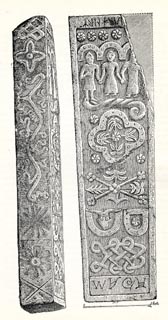 click to enlarge
click to enlargeCV1081.jpg
Engraving by M Petersen.
 click to enlarge
click to enlargeCV1082.jpg
Tracing by W G Collingwood.
Entrance to churchyard:-
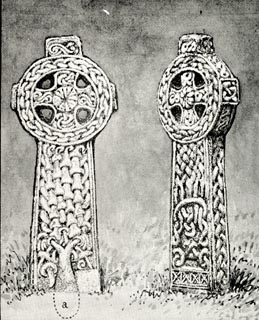 click to enlarge
click to enlargeCV1083.jpg
Lithograph by W S Calverley.
On a window cill in the church,
The Kenneth Cross:-
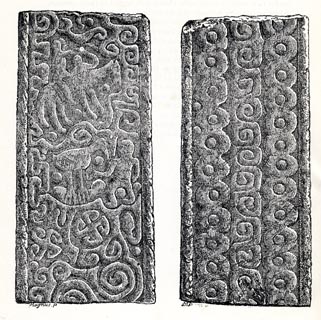 click to enlarge
click to enlargeCV1084.jpg
Engraving by M Petersen.
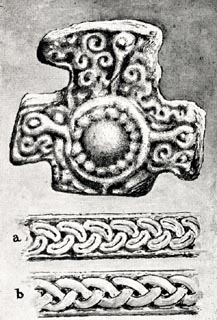 click to enlarge
click to enlargeCV1085.jpg
Sketch by W G Collingwood.
Font:-
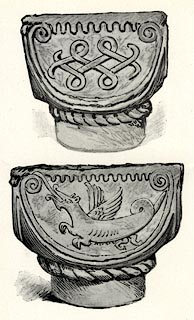 click to enlarge
click to enlargeCV1086.jpg
Sketch by W G Collingwood.
item:- JandMN : 190
Image © see bottom of page
item:- font
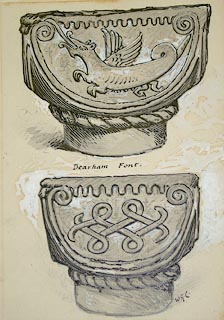 click to enlarge
click to enlargePR0844.jpg
Sketch of the front and reverse of font; carved decoration of interlaced knot on upper sketch. A winged dragon like creature with elongated tongue on lower sketch. The font dates from 11th century?
Drawn to illustrate Notes on the Early Sculptured Crosses, Shrines and Monuments in the Present Diocese of Carlisle, by Rev William Slater Calverley, published by T Wilson, Kendal 1899; opposite p.131.
inscribed at centre:- "Dearham Font."
dated at bottom right:- "W.G.C."
item:- Tullie House Museum : 1902.18.30
Image © Tullie House Museum
 cross slab gravestones
cross slab gravestones| Gilcrouce, John de | 1354 - |
| Derham, John de | 1354 - |
| Hayton, William de, Sir | 1365 - |
| Udall, Robert, Sir | 1535 - |
| Dykes, Edward, Sir | 1578 - |
| Bowman, John, Sir | 1600 - |
| Hurd, Michael | |
| Harrison, William | 1623 - |
| Sleddale, Musgrave | 1662 - |
| Murthwaite, Richard | 1686 - |
| Murthwaite, Peter | 1701 - |
| Ritson, Joseph | 1736 - |
| Sharpe, Anthony | 1737 - |
| Dalzell, A | 1794 - |
| Whitelock, John | 1815 - |
| Swinburn, John | 1834 - |
| Overend, Henry | 1836 - |
| Currie, James | 1839 - |
| Calverley, William Slater | 1877 - |
| Melrose, Thomas W | 1885 - |
| Sugden, Edward Hugh | 1899 - |
 scratch dial
scratch dial scratch dial
scratch dial scratch dial
scratch dial scratch dial
scratch dial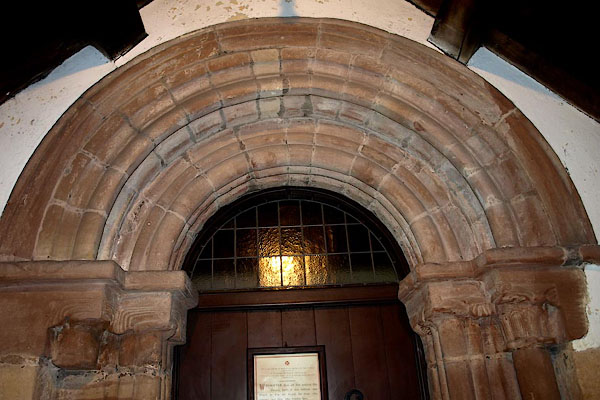
BQH69.jpg Norman door, about 1130?
(taken 27.3.2009)
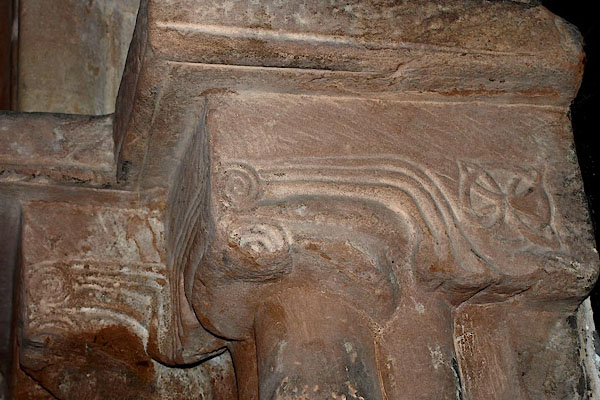
BQH70.jpg Norman door, detail.
(taken 27.3.2009)
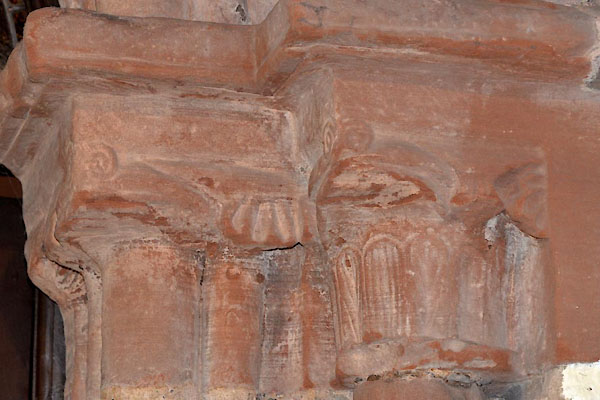
CHA69.jpg Norman door, detail.
(taken 22.2.2018)
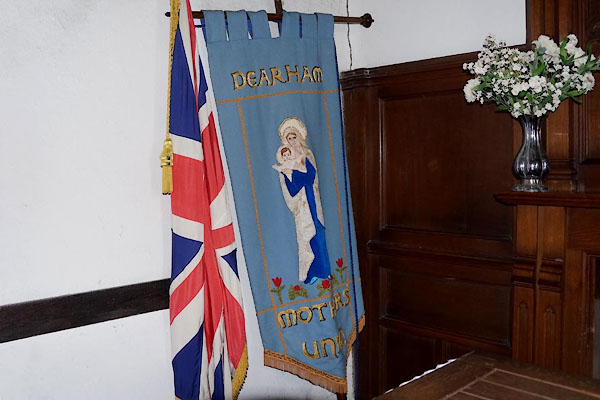
CCS71.jpg Mothers Union banner.
(taken 27.3.2009)
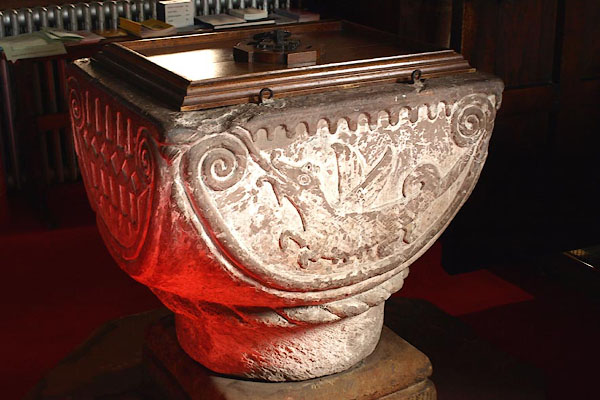
BQH75.jpg Font.
(taken 27.3.2009)
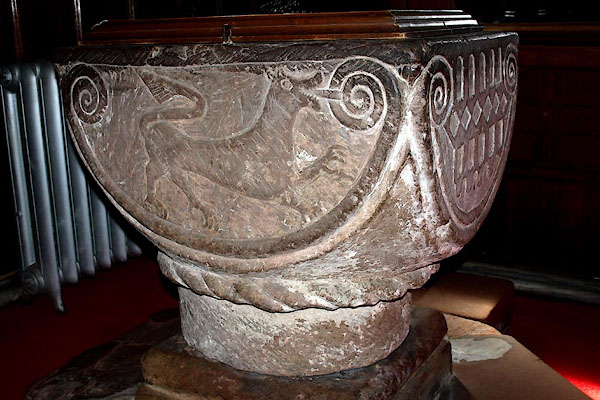
BQH76.jpg Font.
(taken 27.3.2009)
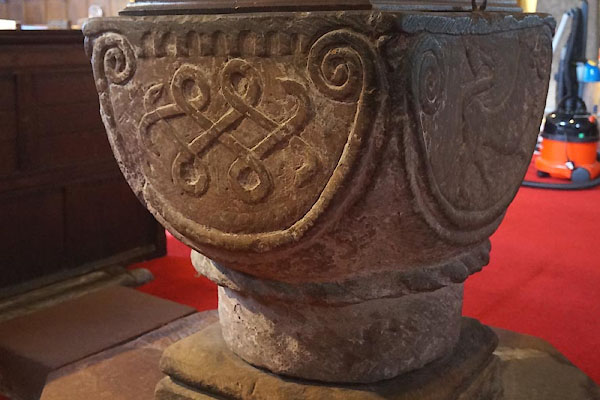
CCS73.jpg Font.
(taken 30.3.2015)
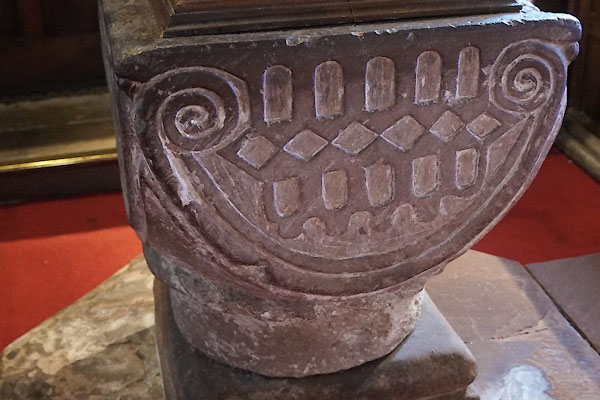
CCS74.jpg Font.
(taken 30.3.2015)
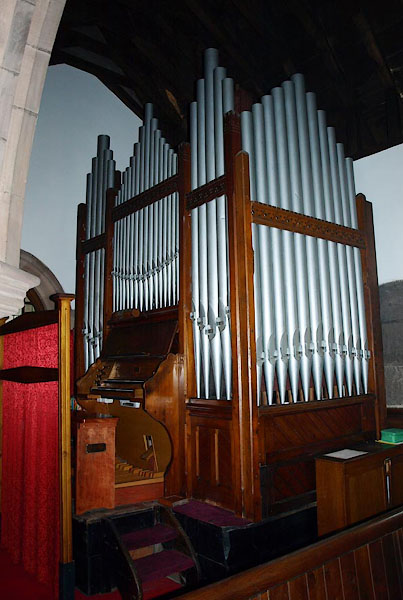
BQH86.jpg Organ, by C H Walker,
(taken 27.3.2009)
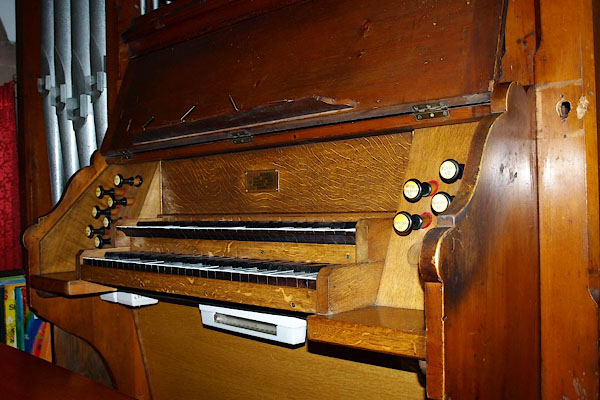
BQH88.jpg Organ, by C H Walker, London.
(taken 27.3.2009)
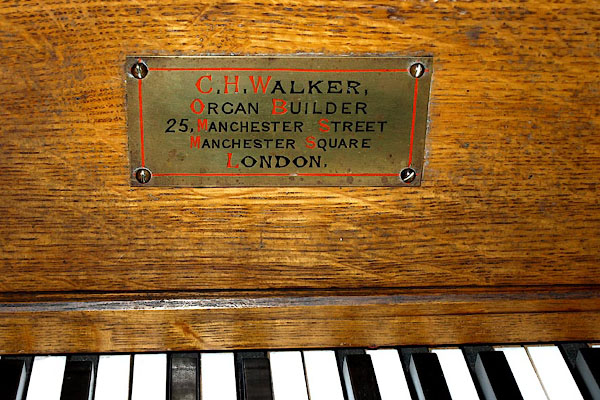
BQH87.jpg Organ, maker's plate:-
"C. H. WALKER, / ORGAN BUILDER / 25, MANCHERSTER STREET / MANCHESTER SQUARE / LONDON" (taken 27.3.2009)
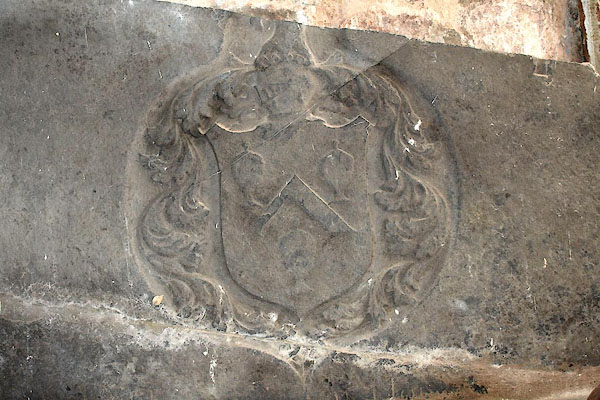
BQH78.jpg Coat of arms, Christian Famly of Ewanrigg Hall.
(taken 27.3.2009)
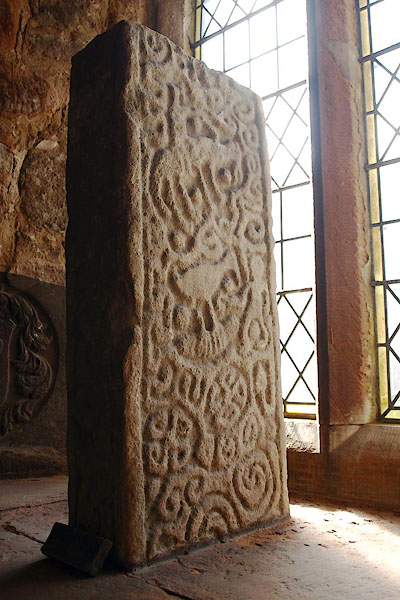
BQH79.jpg The Kenneth Cross; telling the story of St Kenet or Kenedus.
(taken 27.3.2009)
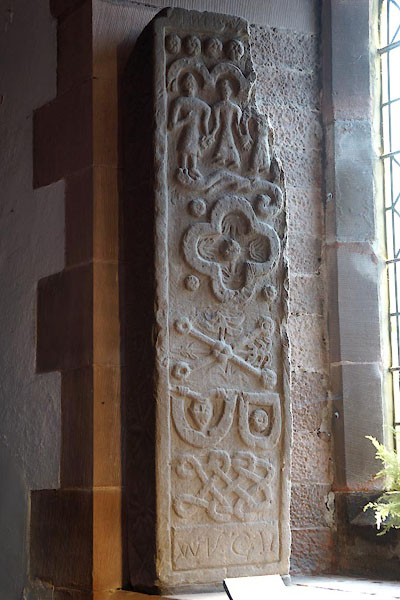
CCS79.jpg The Adam Stone; perhaps representing the Fall and Redemption.
(taken 30.3.2015)
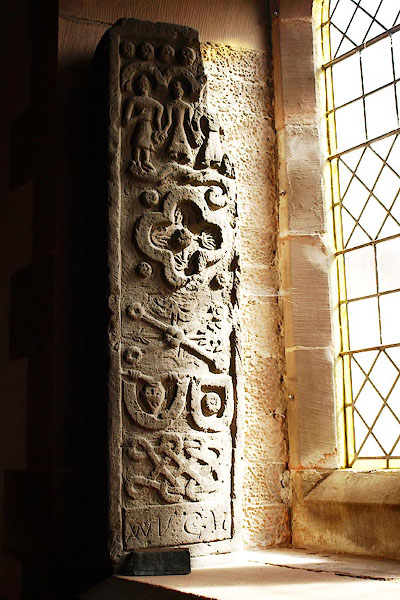
BQH80.jpg The Adam Stone.
(taken 27.3.2009)
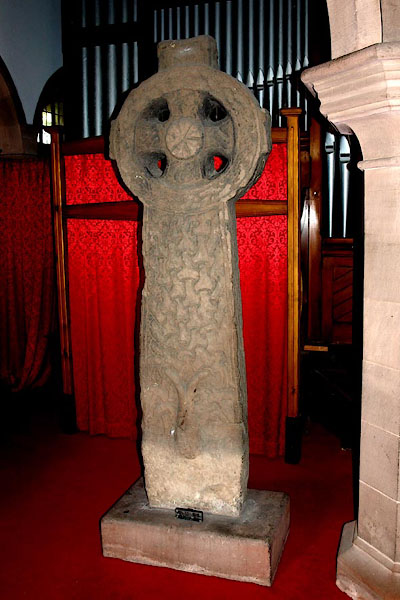
BQH81.jpg Viking Cross.
(taken 27.3.2009)
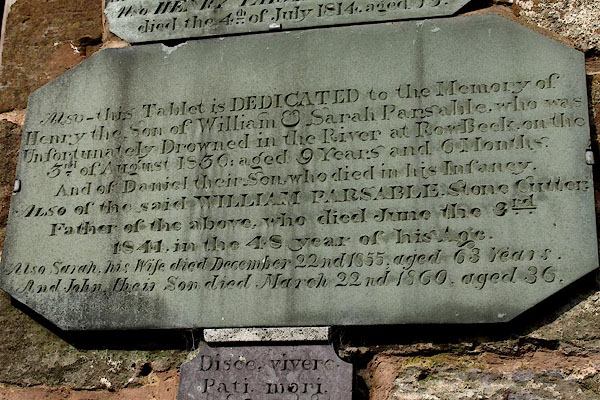
BOU23.jpg A sad memorial:-
"Also - this Tablet is DEDICATED to the Memory of / Henry the Son of William & Sarah Parsable, who was / Unfortunately Drowned in the River at Row Beck, on the / 3rd. of August 1830, Aged 9 Years and 6 Months / ..." (taken 14.3.2008)
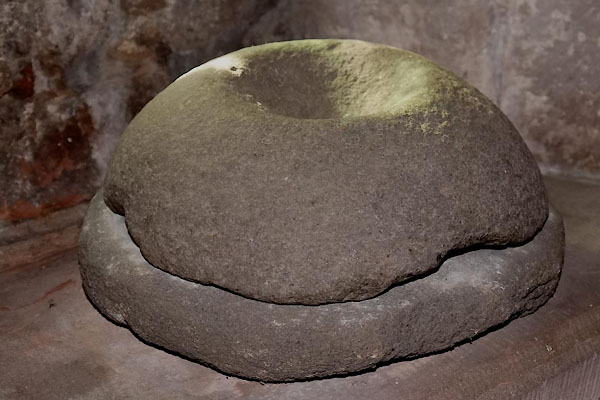
CCS72.jpg Quern.
(taken 30.3.2015)
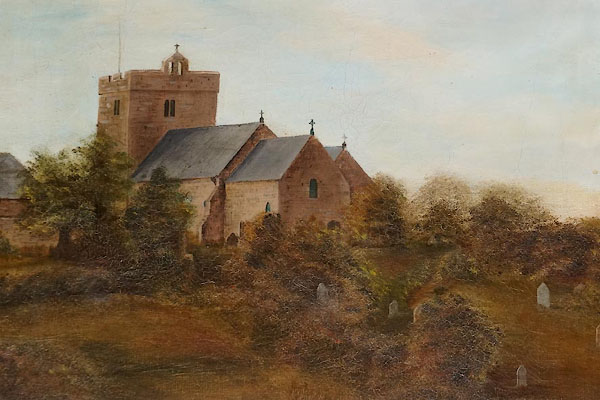
CCS77.jpg (taken 30.3.2015)
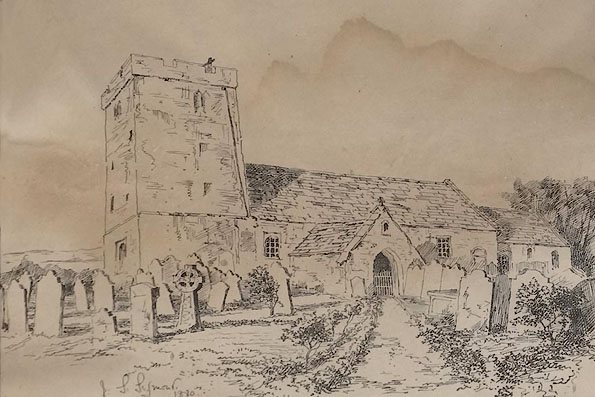
CCS78.jpg (taken 30.3.2015)
